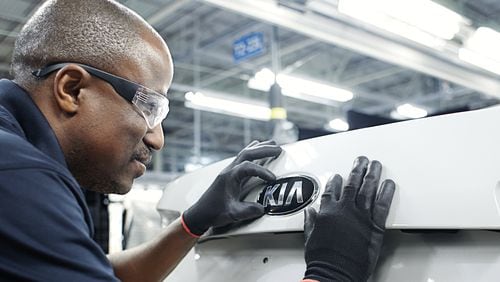Talk of ripping up the current trade deal with South Korea and renegotiating a new pact has sparked fears that the change would hurt trade, chill investment and kill jobs in Georgia.
Trade deals set the rules that can make it easier — or harder — to ship goods, to get through ports, to sell at a competitive price and to invest in a business venture. The U.S.-Korea Free Trade Agreement, often referred to as KORUS, was passed in 2011 and went into effect five years ago.
Critics say its provisions favor the Koreans and cost U.S. jobs. Picking up on that discontent, President Trump has argued that the current rules are unfair and must be rewritten.
South Korean-owned businesses in Georgia directly account for 13,000 jobs in the state, according to the state's Department of Economic Development, which declined to comment on Trump's call for a change in Korean trade. Moreover, Georgia companies export nearly $1 billion a year worth of goods and services to Korea and imports $6.2 billion.
With tensions with North Korea rising, the White House seems to have delayed any move on trade with South Korea. But the president has said he wants to shred the current U.S. trade agreement with South Korea and negotiate another one.
What that would mean is uncertain.
And while business people and economists in Georgia say a better deal might be possible, they are unsettled by the discussion.
“I do worry about a full-blown trade war and its effect on Georgia,” said Jeffrey Humphreys, director of the Selig Center for Economic Growth at the University of Georgia. “We are vulnerable. We are dependent on trade.”
Georgia is the 11th largest exporting state and the seventh-largest for imports. Much of the state’s roughly $500 billion-a-year economy is set up to make, move or store those things being traded.
“We are fairly integrated in the fabric of the global economy,” Humphreys said. “If that fabric begins to unravel, jobs in Georgia would be lost.”
The current arrangement has been good for the state, argued Jorge Fernandez, vice president of global commerce at the Metro Atlanta Chamber. "Korea is a great investor in Georgia."
The current trade pact has been good for Georgia business, even if it is not without flaws, he said. “The Korean agreement took so long to negotiate, to make sure it was fair. Is it absolutely good? No. There’s always room for improvement, for tweaks.”
The largest Korean presence in Georgia is near West Point: the assembly plant run by Kia Motors Manufacturing Georgia. The company's top-ranking local official deflected questions about the chances of a dramatically re-shaped trade environment.
“We watch what is going on,” said Stuart Countess, Kia’s chief administrative officer. “But we like to think about the impact that KMMG has had in this west Georgia community.”
Running around the clock five days a week, the plant has 3,000 employees. About 9,000 other area residents work for the area suppliers who serve the plant – some Korean-owned, some not, said Stuart Countess, Kia’s chief administrative officer.
“That’s what we like to focus on,” he said. “There used to be high unemployment in this area and today that number has been significantly reduced.”
Most of the vehicles that roll off Kia’s assembly line are sold in the United States. But many are shipped through Georgia ports to Canada or Mexico.
The company’s impact to the area includes contributions to local charities and foundations, he said.
But Robert Scott, senior economist at the left-leaning Economic Policy Institute, called the current deal a failure, its positive aspects outweighed by the costs. KORUS was supposed to add about 100,000 jobs and instead it has cost nearly that many – despite companies like Kia, he said.
Even though Georgia added Kia, the state lost Ford and GM plants and some of their suppliers.
“You have to be careful not to lose sight of the forest when you look at the trees,” he said. “There’s been growth in autos and auto parts, and there’s been job losses in the U.S. auto industry.”
It’s good to have Korean plants, but they tend to have less American-made content, he said. So while KORUS was supposed to raise U.S. exports to Korea, they have fallen since 2011 while imports rose.
Still, Georgia has bucked the national trend. The state, like the nation, does runs a trade deficit with South Korea. And while the state's imports from Korean have inched up less than 1 percent since KORUS was passed, Georgia exports to Korea have jumped 17 percent.
“The whole pie has increased – that’s the important thing,” said Chaney Park, president of URIS Global in Norcross, which makes logistical arrangements for Korean and other Asian companies doing business in Georgia.
A former Korean Air executive, Park said he worries about a change in the rules.
“From the perspective of Koreans, Atlanta is one of the best places for business and for living,” he said. “If trade declines, it will impact all businesses involved with Korean companies.”
Georgia’s top exports to Korea include civilian aircraft and parts, woodpulp, kaolin and carpets. The largest imports from Korea are motor vehicles and parts, piston engines and heavy machinery.
Looking at the equation, some in Georgia’s Congressional delegation sidestep the president’s rhetoric and endorse the trade deal as it is.
Sen. Johnny Isakson thinks the status quo is good for the state, said spokeswoman Amanda Maddox. "He supports effective enforcement of the terms of our existing trade agreement with South Korea."
In contrast though, U.S. Rep. Drew Ferguson, who represents the district that contains Kia, tried to straddle the line, praising the Korean company without applauding the Korean trade pact.
As mayor of West Point, he saw the area lose tens of thousands of textile jobs. He praises Kia's factory as "a revitalization" for the region that has spurred local businesses like restaurants, given young people more options and created a stepping stone into the middle class.
He ticked off a list of other issues, from education to tax reform. “The trade agreement has to be the icing on the cake,” he said.
Concern about trade rules is not the only worry for Korean-owned companies in Georgia. It is not even the first on their list of things to fret about, said Minjae Song, an Atlanta-area attorney, whose work is mostly with Korean companies here.
But worry over a potential trade imbroglio comes at a fraught time — especially for carmakers and their suppliers, since they are already struggling to adapt to a changing market: Total vehicle purchases have fallen, while tastes have changed as cheap gas makes big cars and trucks more attractive.
“If the trade agreement gets amended, it will have an impact,” Song said. “But right now, (Korean companies) are more worried about the market situation in the United States.”
The challenge is greatest to suppliers, who have tighter margins of error, he said. “I am already getting calls from small companies asking about bankruptcy. That is not good.”
A less encouraging set of rules for trade would make things worse, he said.
MYAJC.COM: REAL JOURNALISM. REAL LOCAL IMPACT.
AJC Business reporter Michael E. Kanell keeps you updated on the latest news about jobs, housing and consumer issues in metro Atlanta and beyond. You'll find more on myAJC.com, including these stories:
Never miss a minute of what's happening in local business news. Subscribe to myAJC.com.
In other Business news:
Korea trade, Georgia, 2016:
Value, Georgia exports to South Korea: $980.6 million
Value, Georgia imports from South Korea: $6.2 billion
Korea’s rank among export destinations for Georgia: 8th
Korea's rank as source of imports to Georgia: 4th
Number of Korean-owned companies in the state: about 100
Number of jobs at Korean-owned companies in Georgia: about 13,000
Largest Korean-owned entity in Georgia: Kia Motors Manufacturing, 3,000 jobs
Sources: Georgia Department of Economic Development, Korean Consulate, Korean-American Chamber of Commerce, Metro Atlanta Chamber
Global trade, metro Atlanta, 2016:
Metro Atlanta exports: $27.0 Billion.
Jobs supported by exports: more than 96,000.
Share of new jobs in Atlanta added by foreign-owned firms: 31 percent
Sources: Metro Atlanta Chamber, Brookings Institution
Trade Facts
U.S. goods and services trade with Korea: about $144.6 billion,
Exports: $63.8 billion
Imports: $80.8 billion.
Korea’s rank as trading partner to U.S.: 6th
Source: U.S. Trade Representative
Georgia trade deficit with South Korea since trade pact:
2011: $5.4 billion
2016: $5.3 billion
Source: Georgia Department of Economic Development
Some Korean companies with operations in Georgia:
In Fulton County: LG Electronics
In Gwinnett: Samsung Electronics
In DeKalb: Doosan Power Systems
In Cobb: Hyundai Merchant Marine
In Clayton: Hankook Tire
In Cherokee: Sk Hynix America
In Henry: Essex Group
In Troup: Kia Motors Manufacturing
Source: Korea Southeast US Chamber of Commerce
Some Georgia companies with operations in Korea:
American Megatrends, Inc.
Delta Air Lines
First Data Corporation
Hooters of America Inc.
InComm
Invesco
NCR Corp.
Novelis, Inc.
The Coca-Cola Company
Source: Georgia Department of Economic Development








